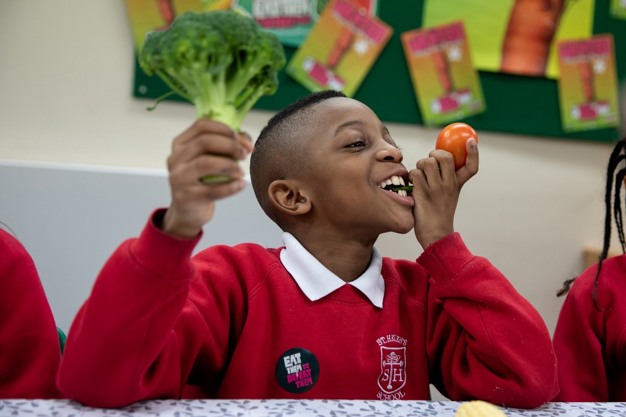Veg Power released its 'Primary school meals: Who decides?' report including new survey data that explores the household decision-making dynamics of primary school meal uptake and barriers to uptake for families. The survey, involving 3,000 parents and carers from across the UK, explored the human factors behind the decision-making process and was undertaken to help uncover new insights that will support further uptake of school meals, regardless of their cost to families or the government.

The survey found that across the UK, children influence over 60% of the decisions around having school meals. 32% are made solely by the parents or carer, 28% just by the child and 39% jointly. In families in which the parent is the sole decision-maker, children were much more likely to have school meals.
The survey also revealed that 26% of children rarely or never have a school meal. 43% of parents of children who never have a school meal said that would change if they were free.
The survey revealed the following insights into uptake of school meals:
- Across all age groups, average consumption is 3.1 school meals per week. This figure declines sharply as children get older, with pupils aged 11 eating (on average) one less school meal per week than those aged 5 or 6.
- At age 5, 11% of children never have a school meal and 6% have only one a week. By the time they're 11, these numbers have jumped to 25% and 11% respectively.
- Among those who eat a school meal at least once a week, children who are entitled to a free meal eat 4.2 meals per week on average against 3.2 meals per week if the parent has to pay.
Interestingly, children in families where household income is between £30,000 and £60,000 per annum eat notably fewer school meals than other income groups.
Dan Parker, Chief Executive at Veg Power said, "This report highlights the many reasons why some families choose not to take up school meals, even when they're free. By understanding these reasons and continuing to try new solutions, we can ensure as many children as possible are making the most of the benefits associated with eating a school meal. At Veg Power, we believe that universal free school meals should be available to all primary school children. If funding all families is economically impossible, we also believe the eligibility threshold should be revisited to enable the 'squeezed middle' to benefit."
Further to this research, Veg Power's recommendations include:
Fully supporting an increase in access to Universal Free School Meals across the UK to all primary school children. 'Per meal' funding should be increased to a minimum of £3.00, index linked and ringfenced. Improve the school food culture to help drive demand.
The full report can be accessed here: https://vegpower.org.uk/insight/
For more information:
www.vegpower.org.uk
